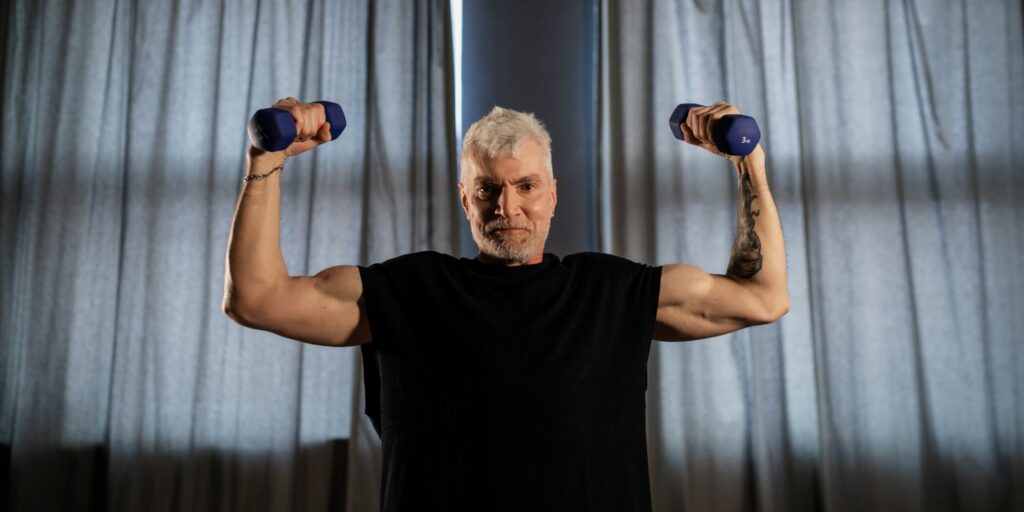
For centuries humans have searched for the solution to their mortality. While it would be an exaggeration to say that weightlifting is going to make you immortal, it does have a range of age-defying benefits.
In recent years, weightlifting has gained immense popularity not only as a means to build muscle and strength but also as a potential contributor to longevity. As people strive to optimize their health and extend their lifespan, the question arises: Can weightlifting truly make you live longer? Let’s explore this topic in detail.

Strength and Muscle Mass Preservation
Have you been saying since your twenties that you’re getting too old for everyday activities?
Preserving muscle mass and strength is crucial for longevity. Weightlifting helps combat sarcopenia, the age-related loss of muscle mass, by maintaining and increasing muscle strength over time.
One of the key factors associated with longevity is the preservation of muscle mass and strength as we age. Weightlifting, also known as resistance training, is particularly effective in maintaining and even increasing muscle mass and strength over time.
As we age, we naturally lose muscle mass and strength, a condition known as sarcopenia. By engaging in regular weightlifting exercises, individuals can combat sarcopenia and preserve their muscle mass, which is essential for maintaining functional independence and overall health as they grow older.
Metabolic Health Improvement:
Discover how weightlifting can improve your bodily functions and fatburning capabilities.
Weightlifting enhances metabolic health by improving insulin sensitivity, lowering blood pressure, and optimizing lipid profiles. These benefits reduce the risk of chronic conditions such as type 2 diabetes and cardiovascular disease, contributing to longevity.

Weightlifting also offers significant benefits for metabolic health, which plays a crucial role in longevity. Resistance training has been shown to enhance insulin sensitivity, lower blood pressure, and improve lipid profiles.
By promoting better metabolic health, weightlifting can help reduce the risk of chronic conditions such as type 2 diabetes, cardiovascular disease, and metabolic syndrome, all of which are linked to premature mortality.
Weightlifting also increases what is known as your EPOC or Post-Exercise Oxygen Consumption (weird acronym, I know). Which in essence refers to calories burned whilst the body cools down from exercise. By increasing this, we burn more calories daily, leading to better metabolisation of foods and better fat loss results.

Bone Density Enhancement:
Frailness is one of the main concerns of the majority of us when it comes to aging. No one wants to be fearful of walking. Weightlifting can help prevent this by promoting the following.
Weightlifting stimulates bone remodelling and helps maintain or increase bone density, mitigating the risk of fractures and osteoporosis. Stronger bones support mobility and overall quality of life as individuals age.
Another important aspect of longevity is bone health. As we age, bone density tends to decline, leading to an increased risk of fractures and osteoporosis.
Weightlifting exercises, particularly those that involve load bearing and resistance, stimulate bone growth, and cell rejuvenation and help maintain or even increase bone density.
By strengthening bones, weightlifting can lower the risk of fractures and contribute to overall mobility and quality of life in later years.
The elderly often suffer from brittle bones, and as such, a simple fall can turn deadly. Each year, 3 million older people are treated in emergency departments for fall injuries.
Don’t become another statistic, use weightlifting to strengthen your bones and prevent this outcome.

Psychological Well-being and Longevity:
Feeling the stresses of everyday life a bit more than you used to? Maybe start weightlifting and see yourself in a new light.
Regular weightlifting exercises promote mental health by reducing symptoms of depression, anxiety, and stress. Improved psychological well-being fosters resilience and contributes to a longer and healthier life.
In addition to its physical benefits, weightlifting can also have a positive impact on mental health and well-being, which is closely linked to longevity.
Regular exercise, including weightlifting, has been shown to reduce symptoms of depression, anxiety, and stress while enhancing mood and self-esteem. The mental health benefits of weightlifting are not only external and mental, but also internal on a chemical level. It has been shown that training releases dopamine, norepinephrine, serotonin and acetylcholine. These are all extremely beneficial for our mental health and well-being.
By promoting psychological resilience and overall well-being, weightlifting can contribute to a longer and healthier life.
While weightlifting alone may not guarantee longevity, it can certainly play a significant role in promoting overall health and well-being as we age. By preserving muscle mass, improving metabolic health, enhancing bone density, and fostering psychological well-being, weightlifting offers a multitude of benefits that can contribute to a longer and healthier life. Incorporating regular weightlifting exercises into one’s fitness routine, along with other healthy lifestyle choices such as proper nutrition and adequate rest, can help optimize longevity and quality of life in the long term. As always, it’s essential to consult with a healthcare professional before starting any new exercise program, especially if you have pre-existing health conditions or concerns.
With consistent effort and dedication, weightlifting has the potential to not only sculpt a stronger physique but also extend the journey of life itself.





